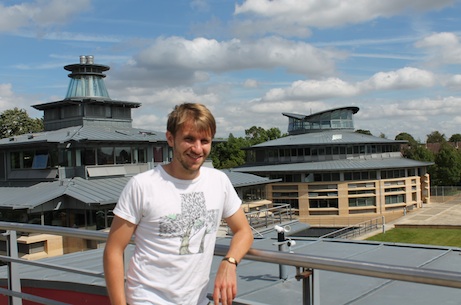
Steffen Loesch's PhD focuses on trying to reduce the possibility of computer error.
Disasters caused by computer error – such as the explosion of the Arianne 5 rocket in 1996 – will soon be a thing of history, according to Steffen Loesch.
Steffen [2009], a PhD candidate in Computer Science, says: “We increasingly rely on computer programs so it is becoming absolutely critical that we are sure that the applications we use are correct.”
He hopes to do his part through his research, which is focused on using formal mathematical models to make computer programs more reliable. His theoretical approach allows him to give mathematical meaning to what programs “do”, primarily through the examination of computer programming language semantics.
He says: “Practical programming languages have a variety of different features and can be highly complex. I am modelling programming languages to make formal methods for proving correctness available to those languages. At present, the technique I am using only works for simple programming languages – but I hope to extend it to more advanced ones.”
He adds: “I believe that in the not too distant future, every safety critical program will not just be tested for functionality. It will also be proven to be correct.”
Early life
Steffen had an early interest in computers, particularly computer games. It was not until high school, however, that he started programming.
His life could have turned out very differently though. In Steffen’s home state in south-western Germany, children are recommended for one of three types of secondary school when they leave primary school, based on their academic abilities. Despite Steffen’s early fascination with computers and his aptitude for maths and science, his schoolmaster did not initially consider him a suitable candidate for the most academic level of secondary school because he was “just a farmer’s boy” in small rural town. Steffen is the son of vineyard and cattle owners. The schoolmaster, however, eventually changed his mind.
Following secondary school, Steffen was able to transfer to a specialised technical secondary school where he could concentrate on computing and programming. In his spare time, he and a friend programmed their own interactive games, using MP3 players to record sound effects. As he acquired further skills, he was able to use them beyond the classroom, for example, in his youth work.
Life outside research
Having attended several youth camps as a child, Steffen became involved in youth work through a local church group, and eventually led summer and winter youth camps with around 60 children and 20 counsellors. At the same time, he trained for and acquired an instructor licence in alpine skiing and worked as an instructor for a local winter ski club.
When he left school, Steffen opted out of military service, which at the time was mandatory in Germany, and worked instead for nine months in a mental hospital where he was able to take part in the implementation of a cognitive training project designed to aid the patients’ power of concentration. The project required patients to play a simple computer game and Steffen’s role was to assist and supervise.
When he finished his community service he still had three months before he was due to start university so he applied to work as a camp counsellor at a boys’ youth camp in Pennsylvania organised by Camp America. “I was keen to visit another country and it meant I could continue my youth camp work,” he says. He was also able to teachsome programming at the camp.
University and postgraduate study
He returned to Germany to start a three-year undergraduate degree in computer science at Saarland University in southern Germany. The university has a good reputation for computer science and for his undergraduate thesis Steffen worked on image processing and computer vision.
This involved extracting sharpened 3D images from blurred 2D source images, using mathematical methods and machine learning. “This was possible,” he explains, “because we worked in a restricted setting of camera motion blur where – for instance – a tree in front of a house was more blurred than the house itself, as the tree was closer to the camera when the picture was taken.”
During his course he applied for postgraduate study at the University of Cambridge where he got a Gates Cambridge Scholarship for his MPhil.
He switched his focus to logic and the theory of programming languages, which Cambridge specialises in.
“I wanted to try something new,” he says, “and I have always been tempted by the mathematical aspects of computer science.”
This same drive to try new things led him to undertake a three-month internship at a German database and business software company after his MPhil. “It was more focused on business administration than research,” he says, “but I wanted to see that more strategic side of the IT industry.”
He returned to Cambridge in 2010 to begin his PhD, also funded by the Gates Cambridge Trust.
Steffen has also taken advantage of his time at Cambridge to become involved in student life. At Saarland University, he had been a student representative and eventually president of the Computer Science Student Council, which involved, among other things, running an annual computer science job fair. At Cambridge he has served as entertainment officer and secretary of the middle common room (MCR) of Trinity College and is currently Gates Cambridge Scholars Council Technology Officer. This involves running all the Gates technological equipment, from TV to scanners, as well as a variety of new technologies, such as the Cambridge-developed Raspberry Pi computer.
True to his desire to try new things, Steffen is keen to keep his options open for life after his PhD, whether that is continuing in academia or working as a technologist. “I have been very focused on theory for a long time, so it might be interesting to do something more practical and applied,” he says.












